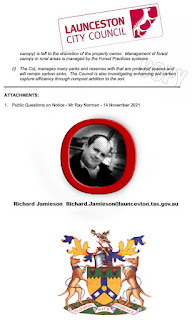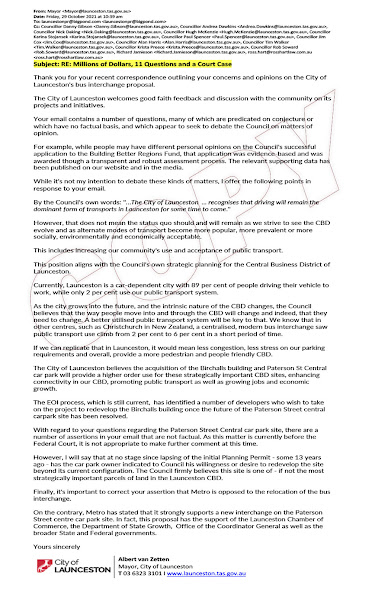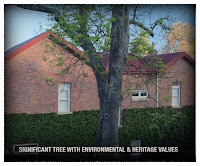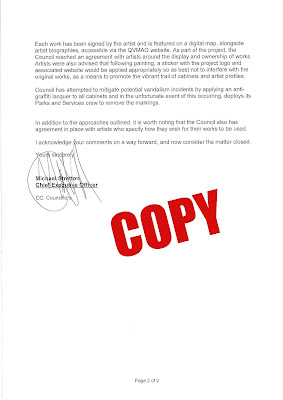Pages
- HOME
- RESUME
- ABOUT
- FEES AND CHARGES
- QVMAG – FEB 27.2020
- QV-Bs-IMAGES
- MEDIA RELEASES
- CoLflyer4blindFILE
- LOCAL GOVERNANCE TASMANIA
- HEALTH ALERT
- COMMUNICATION TO LAUNCESTON GM & MAYOR
- PARTICIPATORY GOVERNANCE
- CULTURAL STRATEGY 7250 2020
- DIRECT DEMOCRACY IN TASMANIA
- CATCHMENT MAP
- B-FILE-29-3-200
- QUESTION TO THE CITY OF LAUNCESTON
- LOCAL GOVT ACT CHANGES
- QV-REPORTING- MAY 5
- QVM AG FEB 2020 REPORT
- QV REPORT ASSESSMENT
- CITY OF LAUNCESTON VALUES
- TRUSTEE LETTER
- Response QVMAG May Activity Report
- OPEN LETTER
- COMPLAINT TO L'TON TOWN HALL MARCH 2021
- COMMUNITY OF OWNERSHIP & INTEREST
- MORAL RIGHTS
- SPECIAL PROTOCOLS
- OBJECTION TEXT
- ADVICE TO RATEPAYERS QUESTIONING CITY OF LAUNCESTON COUNCIL
- MAYOR
Wednesday, December 8, 2021
Monday, November 29, 2021
THE BURCHELL'S CARPARK DEBARCLE IN LAUNCESTON TAS
http://tasratepayers.blogspot.com/2021/10/an-ongoing-saga-about-purchase-of.html
QUESTION TO COUNCIL WITHOUT NOTICE.
In the past I have challenged Council on the appropriateness of its ‘publication protocols’ and its application of its Intellectual Property (IP) protocols in Council’s operation. Over a number of years I have written to Mayor van Zetten and the GM [AKA CEO] and on each and every occasion, and in various ways the responses to me, in precis, has been ‘everything Council does in this regard is legal’ albeit that in many cases this is highly contestable proposition – and it was when I raised the issue.
Moreover, there are examples of less than best practice in the context of ‘Council publications’ relative to widely observed ‘acknowledgement protocols’ that lamentedly casts Council in a rather poor light and in many cases would and should be open to legal challenge. In the past, Council has contested the Moral Rights provisions of the Copyright Act and notably in 2018 in regard to Stephen Walker’s Tasmanian Tableau in Civic Square – See for context https://www.examiner.com.au/story/5483771/walkers-tasmanian-tableau-will-be-put-back-home-in-civic-square/ – Council fell well short of its obligations in regard to the ‘Moral Rights’ of an author and was ultimately forced to ‘put right a wrong’. There are other examples of less than best practice in regard to Council’s somewhat cavalier approach to ‘IP matters’ – arguably attitudes that reflect poorly on community standards on display in the city.
Additionally, Council is predisposed to use images of people in its marketing and in ways that generally do not acknowledge the photographer/author, the subject/person and concerningly where permission has not been sought to use the image in Council’s marketing etc. This is most concerning when the subject is, albeit subliminally, is presented as a ‘token person/whatever’ – token woman, token disabled person, token indigenous person, token obscure ethnicity, etc. etc. However, how might a serving member of Council’s staff deny their ‘employer’ access to imagery of them at work?
This issue I have discussed with Wezley Franckombe who essentially reiterated Council’s past assertions virtually saying (deeming?) that Council’s in-house assessment of its protocols relevant to ‘it’s publications’ finds that they are legal and adequate. Mr Franckombe challenged me to provide him with evidence of Council’s current shortfalls and I randomly selected this years’ QVMAG Annual report where scrutiny reveals:
- The indigenous peoples acknowledgement appears at the beginning of the QVMAG Manager’s report when current reconciliatory convention generally locates such acknowledgement at the very beginning of such publications as a courtesy; and
- Photographic images of people, objects, graphics etc. do not anywhere acknowledge the author/photographer and not always the author/maker of an object of ‘cultural production’ photographed; and
- There is no list of acknowledgements to be found in the report when one would be more than appropriate.
I selected this publication on the grounds that I have IP invested in the QVMAG’s collections and the institution has been the subject of my personal and ongoing research for over 20 years.
Respectfully, I submit that this year’s Annual Report for ‘Council’s operations’, the same might well be said and likewise it can be said of most/all of Council’s marketing material. Compared and contrasted with any other ‘publication’ – say newspapers etc, – Council publication’s standards fall well short best practice I suggest.
Concerningly, it also seems that Council discourages representors et al using/providing evidence in the form of ‘newspaper clippings’ in the context of IP issues. Notably, Australian law sets out a series of clear exceptions to copyright infringement known as "fair dealing". Fair dealing exceptions allow use of copyright material for the purposes of review or criticism, research or study, parody or satire, new reporting, judicial proceedings or legal advice. Thus such advice to representors et al is clearly contestable, and ill founded, as are the standards and protocols Council insists ‘are legal’ and by implication apparently ‘deemed to be’ appropriate in every respect.
Additionally, paraphrased albeit, Mr Franckombe proffered the opinion that legally(?) Council was not required to do more than it does currently. Also, he advised me that he did not know about the existence of the organisation ‘Arts Law … https://www.artslaw.com.au/’, an organisation well placed to offer expert advice to ‘IP OWNERS’, Councils and other organisations etc. on any matter. Alert to this, consequently, Council has access to ‘expert advice’, and as I understand it, Council has an adequate budget allocation in order that it might seek and gain such advice from any source including Arts Law, Arts Tasmania, – https://www.arts.tas.gov.au/home – and/or a range of independent specialist ARTSlaw partitioners.
Against this backgrounding I have framed my question to Council as below.
QUESTION
Will Councillors in open council deliberate on and initiate a process whereby Council’s management is commissioned to:
- Research and review current legal and moral obligations and conventions relative IP issues in the broadest context; and consequent to that
- In doing so seek the advice and services of experts in the field such as Arts Law, Arts Tasmania, et al; and
- Report to Council and Council’s constituency on the IP protocols that operations such as Local Government instrumentalities are morally obliged to initiate and observe towards achieving reconciliatory objectives while embracing current best practice; and
- Recommend a set of protocols that Council will, going forward, proactively observe and implement; and
- Clearly set out, and publish, a clear set of ‘policy protocols’ Council will itself observe and expect of those reporting to Council to observe; and
- Do so by say April 2022.
I look forward with considerable interest to the city’s elected representative’s response.
Ray Norman
<zingHOUSEunlimited>
Sunday, November 28, 2021
ADVICE TO RATEPAYERS WHO WISH TO COMPLAIN ABOUT THEIR COUNCIL
Please find attached a letter from Craig Limkin, Director of Local Government, for your attention.
Regards
Margaret Young
Margaret Young | Executive Officer
Policy and Intergovernmental Relations Division
Department of Premier and Cabinet
Level 5, 15 Murray Street
Hobart, Tasmania 7000
(p) +61 3 6232 7022
Wednesday, November 10, 2021
Saturday, October 30, 2021
The Functions of Councillors
Local Government Act 1993 Version current from 1 July 2020 to date (accessed 31 October 2021 at 13:30)
Monday, October 25, 2021
CLIMATE EMERGENCY POLICY: City of Launceston clearly does not know what to do next
IF you follow 'the science' as each day passes you discover that someone somewhere is actually doing something about implementing a policy that requires action and change.
Local governance is front and centre when it comes to the class of 'cultural landscaping' that is required to develop sustainable communities.
In Tasmania, the rhetoric so, so, often flows thick and fast as do the promises relative to being committed to change for the benefit of the planet, future generations, whatever. However, if you look for evidence on the ground beyond the rhetoric you are not likely to find anything of substance.
Yes, yes you'll be pointed to a 'policy decision' but not to an exemplar of its implementation.
Wednesday, October 20, 2021
Saturday, October 16, 2021
DA 31 Brisbane Street Launceston DA| 0464/2021
Wednesday, August 11, 2021
LETTER FROM LAUNCESTON GM/CEO MORAL RIGHTS
Ray Norman
<zingHOUSEunlimited>
The lifestyle design enterprise and research network
eMAIL 1: raynorman7250@bigpond.com
40 Delamere Crescent Trevallyn TAS. 7250
WEBsites:http://www.raynorman7250.blogspot.com
“A body of men holding themselves accountable to nobody ought not to be trusted by anybody.” Thomas Paine
“The standard you walk past is the standard you accept” David Morrison
Monday, August 9, 2021
Letter from the Director
Dear Mr. Limkin, [Director Local Govt. Tas].





































